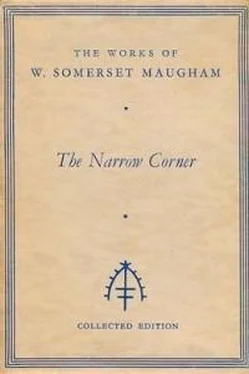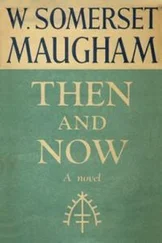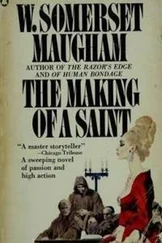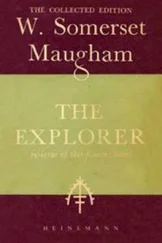Panting a little, for he was somewhat inclined to corpulence, the doctor with his companions ascended the hill on which stood the stronghold, grey and bare, which had commanded the harbour. It was surrounded by a deep moat and the only doorway was high from the ground, so that they had to climb a ladder to enter. Inside the great square walls was the keep, and in this were large and well–proportioned chambers, with windows and doorways of a style that suggested the later Renaissance. Here officers and garrison dwelt. From the upper towers was a spacious and magnificent view.
“It’s like Tristan’s castle,” said the doctor.
The day was softly dying, and the sea was as wine–dark as the sea on which Odysseus sailed. The islands, encircled by the smooth and shining water, had the rich green of a vestment in the treasury of a Spanish cathedral. It was a colour so bizarre and sophisticated that it seemed to belong to art rather than to nature.
“Like a green thought in a green shade,” murmured the young Dane.
“They’re all right from a distance,” said Fred, “those islands, but when you go there—my God! At first I used to want to land. They looked fine from the sea. I thought I’d like to live on one of them for the rest of my life, away from everyone, if you know what I mean, just fishing and keeping my own chickens and pigs. Nichols laughed his head off, said they were lousy, but I insisted on seeing for myself, oh, half a dozen we must have gone to before I gave it up as a bad job. When you got to one of them and went on shore, it all went—I mean, it was just trees and crabs and mosquitoes. It slipped through your fingers, so to speak.”
Erik looked at him with his soft beaming eyes, and his smile was sweet with goodwill.
“I know what you mean,” he said. “It’s always a risk to put things to the test of experience. It’s like the locked room in Bluebeard’s castle. One’s all right so long as one keeps clear of that. You have to be prepared for a shock if you turn the key and walk in.”
Dr. Saunders listened to the conversation of the two young men. He was perhaps a cynic and his withers were unwrung at many of the misfortunes that affect men, but he had a peculiar feeling for youth, perhaps because it promised so much and lasted too short a time, and it seemed to him that there was in the bitterness it experiences when reality breaks upon its illusions something more pathetic than in many graver ills. Notwithstanding the clumsy expression he understood what Fred meant and gave the boy’s emotion the tribute of a sympathetic smile. As he sat there, in the mellow light, in his singlet and khaki trousers, with his hat off so that you saw his dark curling hair, he was astonishingly handsome. There was something appealing in his beauty so that Dr. Saunders, who had thought him a rather dull young man, felt on a sudden kindly disposed to him. Perhaps it was his good looks that deceived him, perhaps it was due to the companionship of Erik Christessen, but at that moment he felt that there was in the lad a strain of something he had never suspected. Perhaps there was there the dim groping beginning of a soul. The thought faintly amused Dr. Saunders. It gave him just that little shock of surprise that one feels when what looked like a twig on a branch suddenly opens wings and flies away.
“I come up here almost every evening to watch the sunset,” said Erik. “To me all the East is here. Not the East of story, the East of palaces and sculptured temples and conquerors with hordes of warriors, but the East of the beginning of the world, the East of the garden of Eden, when men were very few, simple and humble and ignorant, and the world was just waiting, like an empty garden for its absent owner.”
He had a way, that hulking, plain young man, of talking in a lyrical manner that would have been disconcerting if you had not had the feeling that it was as natural to him as to talk of pearl shell and copra and bêche de mer . His grandiloquence was a trifle absurd, but if it made you smile it was with kindliness. He was strangely ingenuous. The prospect was so lovely, the place they sat in, that gaunt, ruined Portuguese fort, so romantic, that there high strains seemed not unfitting. Erik passed his great heavy hand gently over one of the huge blocks of stone.
“These stones and what they’ve seen! They have one great advantage over those islands of yours, you can never discover their secret. You can only guess. And you can guess so little. No one knows anything here. Next time I go back to Europe I shall go to Lisbon and see what I can find out of the fellows who lived here.”
Of course romance was there, but it was vague, and in your ignorance you could only form pictures as blurred as ill–developed snapshots. It was on those towers that the Portuguese captains had stood, scanning the sea for the ship from Lisbon that brought them blessed news of home, or watched with apprehension the Dutch vessels that came to attack them. In your mind’s eye you saw those gallant, swarthy men, in breastplate and hauberk, who carried their adventurous lives in their hands, but they were lifeless shadows, and they owed their substance only to your fancy. There were still the ruins of the little chapel where every day the miracle of transubstantiation took place and whence the priest in his vestments came, during a siege, to administer supreme unction to the soldiers who lay dying on the ramparts. The imagination was tremulous with an indistinct impression of hazard and cruelty and dauntless courage and self–sacrifice.
“Aren’t you ever home–sick?” asked Fred presently.
“No. I often think of the little village from which I come, with black–and–white cows in the green pastures, and of Copenhagen. The houses in Copenhagen with their flat windows are just like smooth–faced women with large, short–sighted eyes, and the palaces and the churches look as if they had come out of a fairy tale. But I see it all like a scene in a play, it is very clear, and amusing, but I don’t know that I want to step on to the stage. I am quite willing to sit in my dark seat in the gallery and watch the spectacle from far away.”
“After all, one’s only got one life.”
“That is what I think, too. But life is what you make it. I might have been a clerk in an office, and then it would have been more difficult, but here, with the sea and the jungle, and all the memories of the past crowding in upon you, and these people, the Malays, the Papuans, the Chinese, the stolid Dutch, with my books and as much leisure as if I were a millionaire—good heavens, what can the imagination want more?”
Fred Blake looked at him for a moment, and the effort of unaccustomed reflection made him frown. When he understood what the Dane meant, his surprise was evident in his voice.
“But that’s all make–believe.”
“It’s the only reality there is,” smiled Erik.
“I don’t know what you mean by that. Reality’s doing things, not dreaming about them. One’s only young once, one must have one’s fling, and everyone wants to get on. One wants to make money and have a good position and all that sort of thing.”
“Oh no. What does one do things for? Of course one has to work a certain amount to earn one’s living, but after that, only to satisfy the imagination. Tell me, when you saw those islands from the sea and your heart was filled with delight, and when you landed on them and found them a dreary jungle, which was the real island? Which gave you most, and which are you going to treasure in your memory?”
Fred smiled into Erik’s eager, gentle eyes.
“That’s bloody rot, old boy. It’s no good thinking the earth of something and when you come down to brass tacks finding out to your cost that it’s a wash–out. One doesn’t get much forrader by not facing facts. Where d’you expect to get to if you just take things at their face value?”
Читать дальше
Конец ознакомительного отрывка
Купить книгу










